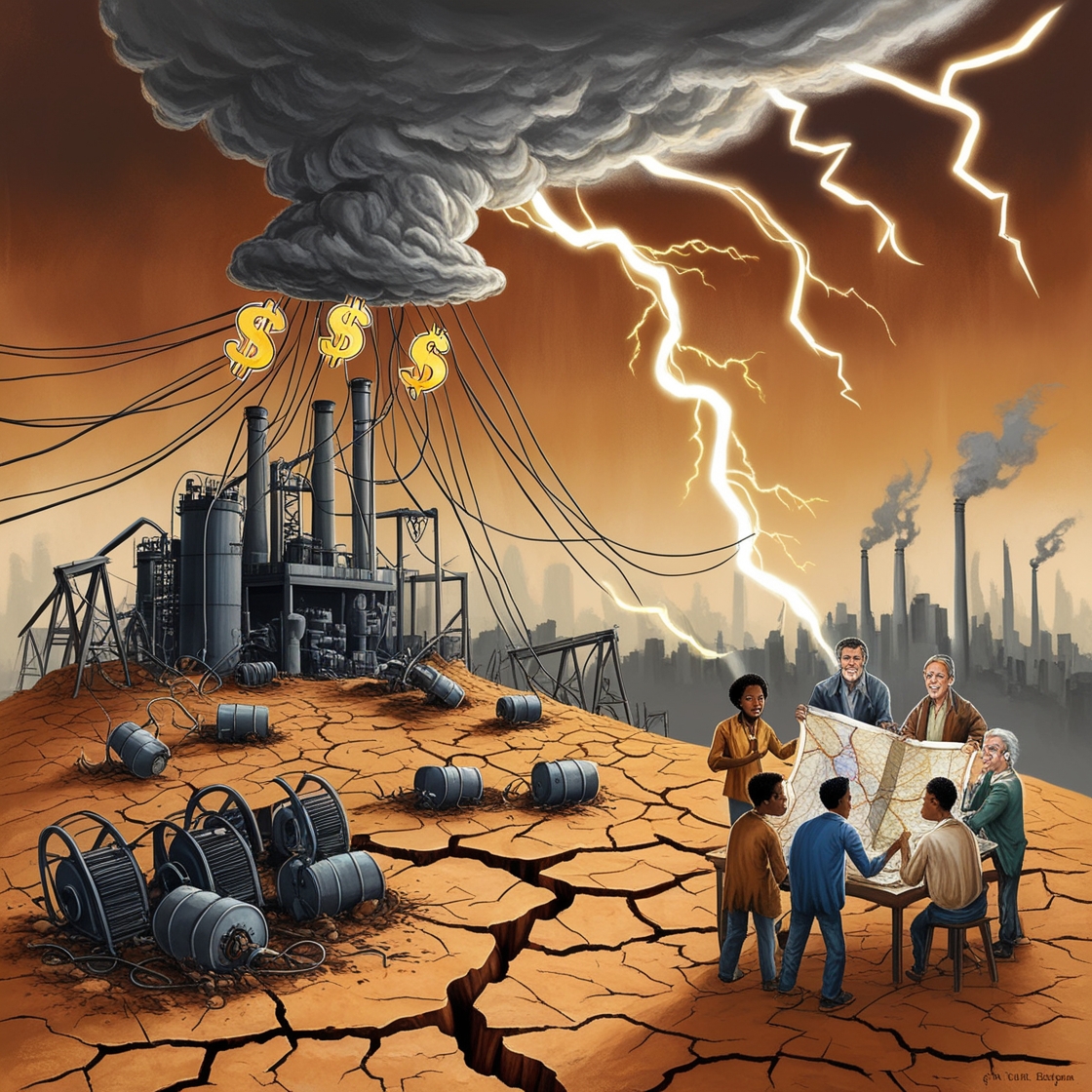In the 21st century, climate change is a pressing issue. It affects our environment and the global economy. The effects of climate change are seen in many sectors and communities.
Studies by the Intergovernmental Panel on Climate Change (IPCC) show huge economic risks. It’s important to know how this crisis will change our financial world. This article looks at how climate change and the economy are connected. It also talks about the need for new, green solutions to protect our planet.

Key Takeaways
- Climate change significantly affects the global economy by presenting numerous economic consequences.
- The urgency of addressing climate change is underscored by projections from reputable studies like those from the IPCC.
- Sustainable solutions are essential for mitigating the adverse impacts of climate change.
- Understanding the interplay between environmental changes and economic outcomes is critical for planning initiatives.
- This article explores various ways climate change influences economic sectors worldwide.
Understanding Climate Change
Climate change means a big change in Earth’s average weather. It’s a key topic in climate science, which studies these changes. The main cause is more greenhouse gases, like carbon dioxide and methane, from human actions like burning fossil fuels and cutting down trees.
The science behind climate change looks at how the Earth’s atmosphere and the sun’s energy work together. When greenhouse gases go up, they hold more heat, making the planet warmer. NASA says the last 100 years have seen a big jump in these gases, changing weather and ecosystems all over.
Climate change’s effects are clear, like more extreme weather, rising sea levels, and changes in where animals live. These changes harm the environment and bring big challenges to many areas. This shows how deeply connected climate science is to our future.
Knowing about climate change helps us understand its economic effects. It shows we need to act fast to lessen its harm. The link between greenhouse gases and warming is a strong reason for us to work towards a sustainable future.
Economic Consequences of Climate Change
Climate change affects more than just the environment. It also impacts government budgets and business operations. As disasters linked to climate change grow more common, the financial toll becomes clear. Governments spend a lot on disaster relief, which takes away from funds for schools, roads, and healthcare.
Infrastructure is another big area hit hard. Storms, floods, and wildfires cause expensive repairs and rebuilding. The National Oceanic and Atmospheric Administration says these disasters cost billions each year. Climate change also makes diseases and heat-related illnesses more common, affecting public health.
The insurance industry faces a big challenge with rising premiums due to more claims from climate events. Homeowners and businesses struggle with these higher costs. This shows how hard it is for vulnerable communities to deal with the financial effects of global warming. It’s more important than ever to build resilience against these impacts.

Climate Change in the World and Its Influence on the Economy
Climate change is a big problem for many areas, especially for farming and work. Changes in weather, higher temperatures, and more extreme rain or drought hurt crops and make work harder. This shows how big of an impact climate change has on the economy.
Direct Effects on Agriculture
The effect of climate change on farming is huge. Warmer temperatures and unpredictable weather harm crops and threaten food safety. For example, a report from the Food and Agriculture Organization (FAO) shows that farming areas are seeing big drops in productivity because of bad weather.
As droughts happen more often, farmers have fewer ways to water their crops. This leads to lower crop yields and more stress on food supplies.
Impact on Labor Productivity
Climate change and work efficiency are closely connected. Bad weather can make workers less productive. The World Bank found that high temperatures make people less focused and more tired.
This drop in work efficiency means economic problems for industries that rely on physical labor. This includes farming and manual work. Businesses have to spend more money to keep up with work levels, because of the environment.
| Impact Area | Effect of Climate Change | Economic Consequences |
|---|---|---|
| Agriculture | Reduced crop yields due to extreme weather | Increased food prices, food insecurity |
| Labor Productivity | Diminished working capacity in extreme heat | Loss of efficiency, increased operational costs |
Changing Weather Patterns and Economic Disruption
Extreme weather events like hurricanes and floods can really hurt local economies. They damage homes, disrupt lives, and strain local resources. It’s key for communities to understand the economic impact of these disasters to recover and rebuild.
The Role of Hurricanes and Floods
Every hurricane season, communities prepare for the worst. Flooding can cause huge costs, affecting homes, businesses, and infrastructure. FEMA reports show the financial burden of hurricanes, like Harvey, is often too much for local economies to handle.
Insurance claims often don’t cover all the damage. This forces cities to make tough financial choices.
Long-term Drought and its Economic Costs
Droughts also have a big economic impact. They hurt agriculture, raising irrigation costs and reducing crop yields. Water-dependent industries suffer when water is scarce, affecting the economy.
States with long droughts see job losses and lower GDP. This shows climate change’s wide-reaching effects, beyond just weather.

Investment in Renewable Energy
Renewable energy investment is a big chance for the planet and the economy. Sources like solar and wind power fight climate change and boost jobs and growth. Knowing the benefits of these clean energy options shows their key role today.
Economic Benefits of Solar Power
Solar energy’s benefits are clear as tech gets better and costs fall. States investing in solar see great results, like:
- More jobs in making, setting up, and fixing solar systems.
- Lower electricity bills for people and businesses.
- Local economies grow with solar farms and installations.
For example, California’s solar push has brought in private money and thousands of jobs. It shows solar energy plans can really work.
Wind Energy as a Sustainable Alternative
Wind energy helps meet green energy goals. Wind farms show that investing in wind pays off. The benefits include:
- Jobs in building and running wind farms.
- Stable energy prices by using different energy sources.
- Less use of fossil fuels means fewer greenhouse gases.
Places like Texas have grown economically with wind energy. This leads to more energy freedom and jobs in wind.
Shifts in Global Supply Chains
The world of global supply chains is changing fast because of climate change. Companies are now facing global supply chain challenges as extreme weather events happen more often. Events like hurricanes, droughts, and floods affect production and change how companies source materials.
Climate change is making companies rethink their logistics and how they manage their stock. Studies show that companies that focus on sustainability can adjust quicker to changes. This gives them a big advantage over others. Sustainable practices often mean using local suppliers and having many suppliers, which helps avoid risks from relying too much on one place.
Looking at old and new supply chain models shows big differences. Old models might focus on saving money but are more at risk in a changing climate. New models, on the other hand, are all about being flexible and creative. This helps companies do well even when things get tough.
- Working more closely with suppliers to make things better.
- Using new tech to keep track of supply chains in real time.
- Coming up with new ways to move goods to avoid problems caused by the weather.
Experts say companies need to focus on being adaptable to get through these tough times. By changing how they do things because of climate change, companies can protect themselves and help the economy stay strong.
Climate Change and Economic Growth
Understanding the link between climate change and the economy is key. We must look at how being green affects our economy. It’s vital to grow our economy in a way that’s sustainable for now and the future.
Nations are trying to grow their economies while protecting the environment. Using green economic practices is a big part of this effort.
The Interplay Between Sustainability and Growth
A green economy means using sustainable ways to grow. Investing in green tech can create jobs and make things more efficient. Cutting down on carbon emissions helps the planet and makes our economy stronger.
Experts say there are a few ways to grow the economy while being green:
- Using renewable energy instead of fossil fuels.
- Making things more energy-efficient.
- Supporting farming that’s good for the planet and food.
- Backing research in green tech.
Here’s a table showing how green practices can help the economy:
| Sustainable Practice | Potential Economic Growth (%) | Job Creation (Estimated Jobs) |
|---|---|---|
| Renewable Energy Implementations | 10-15 | 1,000,000+ |
| Energy Efficiency Improvements | 8-12 | 500,000+ |
| Sustainable Agriculture Methods | 5-10 | 300,000+ |
| Green Technology Innovations | 15-20 | 250,000+ |
Making policies that support green growth can help our economy and fight climate change. By choosing sustainable growth, we can benefit economically and protect the planet for the next generations.
Carbon Footprint and Economic Strategies
Dealing with climate change through smart economic plans is key for a green future. Carbon pricing is a popular method. It puts a price on greenhouse gas emissions. This way, governments encourage companies to use cleaner technologies.
Many countries have used these plans to grow their economies while protecting the environment.
Understanding Carbon Pricing
Carbon pricing, like taxes or cap-and-trade systems, makes polluters pay for their emissions. Sweden and Canada have seen big economic wins from these steps. Businesses work to cut their carbon footprint to save money.
This move also highlights the need for environmental care. It also boosts the economy by supporting the growth of green tech.
Reducing Carbon Footprint for Economic Benefit
Working together, businesses and governments can make a big difference. By adopting green practices, companies meet global climate targets and save money. For example, investing in energy efficiency and renewables cuts costs.
As more companies see the financial benefits of being green, we’ll see a shift towards sustainability. This will lead to lasting economic growth.
FAQ
What are the primary causes of climate change?
The main causes of climate change are human activities. These include burning fossil fuels, cutting down trees, and industrial processes. These actions increase greenhouse gases, raising global temperatures and changing weather patterns.
How do climate changes impact the global economy?
Climate changes hurt the economy in many ways. They cause property damage, lower crop yields, and raise health costs. These effects slow down economic growth and make markets unstable.
What sectors are most affected by climate change?
Climate change hits hard on agriculture, finance, healthcare, and infrastructure. For example, weather changes can reduce crops. Extreme weather can also damage buildings and disrupt supply chains.
What are the economic benefits of investing in renewable energy?
Renewable energy brings many economic gains. It creates jobs, lowers energy bills, and boosts energy independence. It also helps avoid the financial risks of climate change.
How does climate change affect global supply chains?
Climate change makes supply chains harder to manage. It leads to more extreme weather and changes in resource availability. Companies need to adapt to these changes to stay safe.
What role does carbon pricing play in combating climate change?
Carbon pricing is a way to fight climate change. It makes polluters pay for their carbon emissions. This encourages companies to use less carbon, promoting green investments and helping the economy.
How can sustainable practices contribute to economic growth?
Sustainable practices boost the economy by driving innovation and cutting costs. They make countries more competitive. Investing in green tech opens up new markets and chances for growth.



